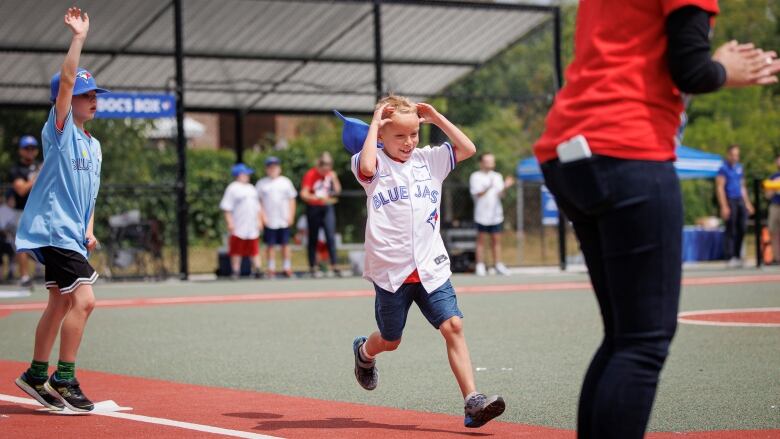Roy Halladay Field, Toronto's 1st fully-accessible baseball diamond, opens in Scarborough
Roy Halladay Field officially unveiled by Jays Care Foundation

Roy Halladay Field, Toronto's first fully-accessible baseball diamond, officially opened Wednesday, its name a fitting tribute to the late baseball legend known not only for his skill but for giving back to young people in the community.
His wife Brandy said building a ballpark like the Scarborough facility was always a dream of theirs.
"I'm just so so excited it's here in Toronto for all of these kids and adults to use for years to come," Brandy Halladay told reporters at the official ribbon-cutting.
Representatives from the Jays Care Foundation — the charitable arm of the Toronto Blue Jays — city officials, the Halladay family and about 150 others were on hand for the launch, where kids got a chance to run the brand new bases at Highview Park near Danforth Avenue and Birchmount Road.
The field was made possible with a $1-million capital infrastructure grant from the charitable foundation, according to a Blue Jays news release.
It will be used for the Challenger Baseball program, an adaptive baseball program for children with cognitive and/or physical disabilities, run by Jays Care with Baseball Canada and Little League Canada.
Two Challenger Baseball teams played a game after the opening ceremony, wearing Jays jerseys with Roy Halladay's retired number 32.
Halladay — nicknamed "Doc" — pitched for the Jays from 1998 to 2009 and then the Philadelphia Phillies from 2010 to 2013. He became an immediate fan favourite when he almost pitched a no-hitter during his second game as a pro starter.
He would go on to be an eight-time MLB All-Star and he often led the league in number of innings pitched and complete games.

Halladay died in 2017 at the age of 40 after he crashed his amphibious plane into the Gulf of Mexico near Florida.
Toronto Mayor John Tory said in his speech that Halladay "extended extraordinary caring" to the people of his "chosen city."
During his time with the Jays, the Halladays would invite patients from the Hospital for Sick Children and their families to watch games from a suite at Rogers Centre — known as "Doc's Box" — each season.
For Doc's Box and other charitable endeavours, the Jays nominated Halladay several times for the Roberto Clemente Award, given annually to the MLB player who best exemplifies sportsmanship, community involvement, and contributions to the team.

Halladay was posthumously inducted to the Baseball Hall of Fame in 2019. Brandy Halladay wiped away tears speaking on his behalf during the ceremony, thanking both the Toronto Blue Jays and Philadelphia Phillies for their support over the years.
"Thank you for allowing us to grow up, to fail over and over, and to learn how to succeed within your organizations," she said in her speech.
WATCH/ Halladay's wife, Brandy, gets emotional at her husband's Hall of Fame induction:
She described Halladay as a "nervous husband and father," who "so desperately" wanted to be as successful in his personal life as he was in his career.
"His goal in retirement was to make a positive impact on youth baseball, and as a family, we are dedicated to continuing that work on Roy's behalf."
Brandy Halladay said Wednesday she and her sons had a busy schedule ahead, but that being in Toronto for the ceremony was the one trip they collectively agreed not to miss.
"And the fact that it's as important to them as it was to their dad and I, it means that they've learned those lessons, that they've caught on."
She wiped away tears when asked about what her late husband would think of an accessible diamond named after him.
"He would be so honoured, he would be humble, he'd be embarrassed — he didn't like the attention," she said. "But he would've been really excited."
"And instead of standing here doing media, he'd be out on the field, which says a lot about him and his character, and how much this would mean to him."
She told reporters it's important to her to continue to support charitable foundations, as is being able to bring out what was important to Roy personally, not just professionally.
"Baseball is not what he was, it's just what he did."
With files from Greg Ross


